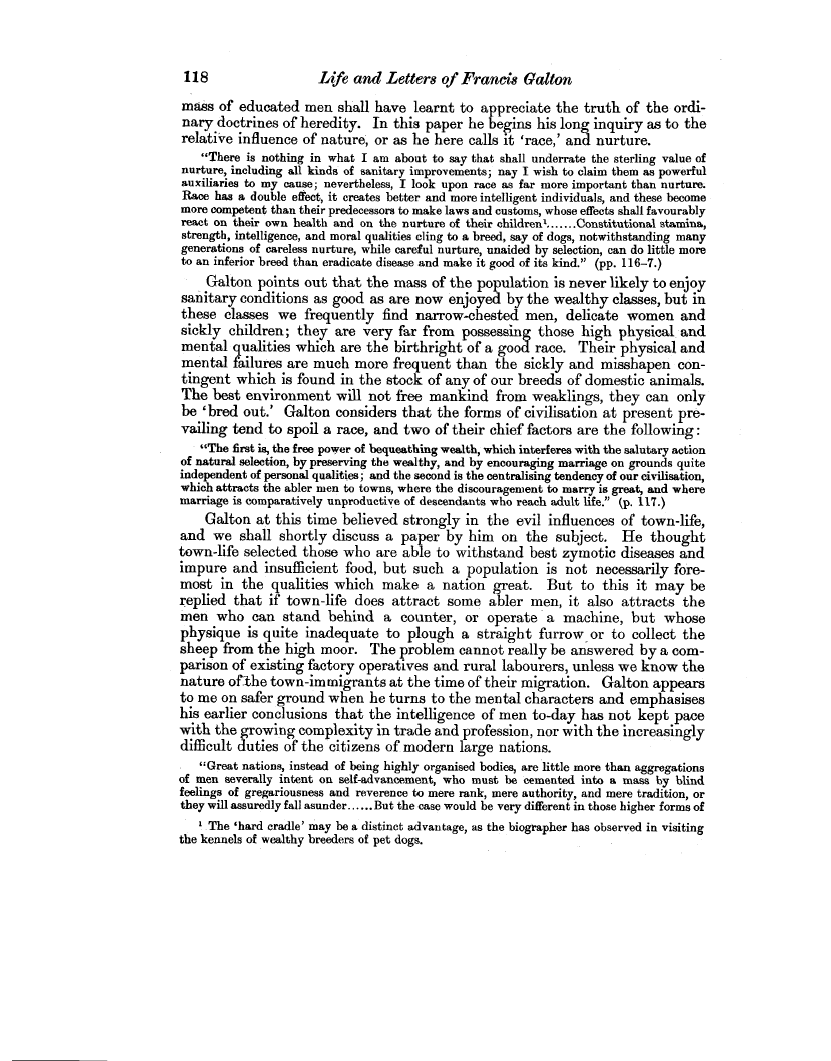118 Life and Letters of Francis Galton
mass of educated men shall have learnt to appreciate the truth of the ordinary doctrines of heredity. In this paper he begins his long inquiry as to the relative influence of nature, or as he here calls it `race,' and nurture.
"There is nothing in what I am about to say that shall underrate the sterling value of nurture, including all kinds of sanitary improvements; nay I wish to claim them as powerful auxiliaries to my cause; nevertheless, I look upon race as far more important than nurture. Race has a double effect, it creates better and more intelligent individuals, and these become more competent than their predecessors to make laws and customs, whose effects shall favourably react on their own health and on the nurture of their children' Constitutional stamina, strength, intelligence, and moral qualities cling to a breed, say of dogs, notwithstanding many generations of careless nurture, while careful nurture, unaided by selection, can do little more
to an inferior breed than eradicate disease and make it good of its kind." (pp. 116-7.)
Galton points out that the mass of the population is never likely to enjoy sanitary conditions as good as are now enjoyed by the wealthy classes, but in these classes we frequently find narrow-chested men, delicate women and sickly children; they are very far from possessing those high physical and mental qualities which are the birthright of a good race. Their physical and mental failures are much more frequent than the sickly and misshapen contingent which is found in the stock of any of our breeds of domestic animals. The best environment will not free mankind from weaklings, they can only be `bred out.' Galton considers that the forms of civilisation at present prevailing tend to spoil a race, and two of their chief factors are the following
"The first is, the free power of bequeathing wealth, which interferes with the salutary action of natural selection, by preserving the wealthy, and by encouraging marriage on grounds quite independent of personal qualities; and the second is the centralising tendency of our civilisation, which attracts the abler men to towns, where the discouragement to marry is great, and where marriage is comparatively unproductive of descendants who reach adult life." (p. 117.)
Galton at this time believed strongly in the evil influences of town-life, and we shall shortly discuss a paper by him on the subject. He thought town-life selected those who are able to withstand best zymotic diseases and impure and insufficient food, but such a population is not necessarily foremost in the qualities which make a nation great. But to this it may be replied that if town-life does attract some abler men, it also attracts the men who can stand behind a counter, or operate a machine, but whose physique is quite inadequate to plough a straight furrow_ or to collect the sheep from the high moor. The problem cannot really be answered by a comparison of existing factory operatives and rural labourers, unless we know the nature of.-the town-immigrants at the time of their migration. Galton appears to me on safer ground when he turns to the mental characters and emphasises his earlier conclusions that the intelligence of men to-day has not kept pace with the growing complexity in trade and profession, nor with the increasingly difficult duties of the citizens of modern large nations.
"Great nations, instead of being highly organised bodies, are little more than aggregations of men severally intent on self-advancement, who must be cemented into a mass by blind feelings of gregariousness and reverence to mere rank, mere authority, and mere tradition, or they will assuredly fall asunder But the case would be very different in those higher forms of
i The 'hard cradle' may be a distinct advantage, as the biographer has observed in visiting the kennels of wealthy breeders of pet dogs.

